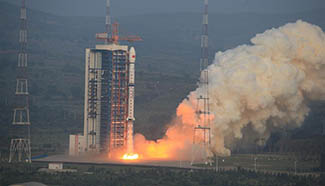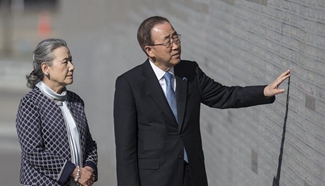
A truck transfers containers at Qingdao port in Qingdao, east China's Shandong Province, Aug. 8, 2016.(Xinhua/Yu Fangping)
BEIJING, Aug. 10 (Xinhua) -- China is looking to universities and research institutes for an engine to sustain economic growth and drive economic restructuring.
On Monday, the State Council published a national plan for progress in science and technology by 2020, listing a set of targets as well as government actions to help meet them.
Among the set goals, the country aims to have knowledge-intensive services account for 20 percent of gross domestic product (GDP) by 2020, up from 15.6 percent in 2015, and make total factor productivity, of which technology is a sub-set, account for 60 percent of growth in 2020, up from 55.3 percent last year.
The document came as the traditional incentives that have driven the country's economic miracle, such as cheap manpower and intensive government spending, are lapsing.
China is in the midst of large-scale economic restructuring to shift its growth pattern, but the maneuver has been painful. This explains the high expectations for science and technology to create new businesses, upgrade industries and provide more jobs.
In the plan, the country pledged greater input for research areas with high economic potential, such as computer chips, integrated circuit equipment, broadband mobile telecommunication, digital machinery, nuclear power, genetic modification, new materials and modern agriculture.
Several cutting-edge areas, such as space science, deep-sea exploration, quantum computing, artificial intelligence and brain science, have been highlighted for their importance for national strength and security.
However, the plan covers some research areas that had previously been sidelined, such as urban planning technology, eco-friendly infrastructure, natural disaster early warnings and security control.
Much of the plan addresses research areas related to governance and quality of life, which were previously not priorities in scientific and technological development plans.
This reveals an interesting shift by the government, which has been working to improve efficiency and cut red tape. Science and technology have become promising new tools for the government to deal with the fast pace of change in Chinese society and the problems that accompany it.
Monday's plan is not just about scientists and researchers but also business people and the government.
The document also emphasizes efforts to remove barriers between academia and the market.
No matter how many outstanding achievements scientists make, if those with commercial potential cannot reach the market, they will not actually boost the country's reform and restructuring.
Having been a planned economy for decades, China has been late to introduce market forces to research and development, and even today universities and institutes, many of which are publicly funded, are cautious about walking too close with business.
With the plan, the country is set to create a direct and close link between scientists and enterprises so research projects can gain diverse funding outside government budgets, and new technology can find customers more easily.
The government will encourage enterprises to invest more in R&D and offer preferential policies for knowledge-intensive startups. It will even allow leading enterprises to join state-level research projects.
Currently, the plan is still a general framework, and detailed policies and actions are needed. But it is a good start and, if successful, will shape the country into a real power.
Related:
Business results show encouraging signs in Chinese economy
BEIJING, July 26 (Xinhua) -- The performance sheets of Chinese companies reveal an encouraging landscape on reform efforts despite slowdown in the country's economy, Tuesday's Economic Information Daily reported.Full Story
Interview: Chinese economy still full of vitality: Panasonic president
BEIJING, May 30 (Xinhua) -- "Despite pessimistic talk about the Chinese economy in some Japanese media, I'm constantly impressed by the changes brought about by China's rapid economic development every time I come," Panasonic President Kazuhiro Tsuga said here.Full Story
Economic Watch: Chinese economy mixed by encouraging signs, lingering concerns
BEIJING, April 28 (Xinhua) -- While economic indicators offer some hope, structural problems have thrown up barriers on China's road toward a solid recovery.Full Story











